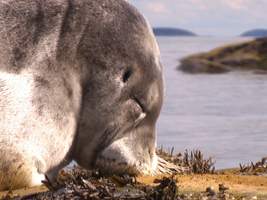You are on the first web site of Biotic Regulation. Since February 14, 2008 it is no longer updated. Welcome to www.bioticregulation.ru! New address of this page: www.bioticregulation.ru/ques/ques19.php |
Your questions on biotic regulation (November 2007)
How can it be that both unicellular and multicellular organisms co-exist on our planet? Didn't the latter enter the biosphere as more progressive and should have then outcompeted the former in the struggle for survival?
Asked by Lisa, visitor of our site, on the 2nd of November, 2007.


|
| There is no struggle for survival among different extant species in natural ecological communities. Competition is intraspecific. |
It is the strongest who wins in any fight. This is the definition of the notion "the strongest". If it is a fight for the death, then, by definition, it is the weakest, who are eliminated, and the strongest, who survive. The word "strong" can be replaced by "competitive" or "progressive", yet the meaning of the winners and losers will be there.
Nature gives a common home to unicellular and multicellular organisms, which both survive and co-exist. Two interpretations of this fact suggest themselves. 1. Either unicellular and multicellular species are equally strong, competitive and progressive in the struggle for survival. 2. Or the struggle for survival does not exist.
The first interpretation seems to be less probable than the second one. In any sport games, for example, it is always possible to tell the winner, even if the competitors are approximately equal in their skills. In light athletics coincidence of the results is counteracted by increasing resolution of measurements (two results identical if measured in seconds, become different if one increases the resolution to tenths or hundredths of second). In soccer there are penalties, in tennis there are tie-breaks. Life is several billion years old. Having all this time, it should not be difficult to find ways of determining the strongest. Therefore, the observed co-existence of the unicellular and multicellular organisms means that they do not struggle for existence with each other (and have never done).
And, more generally, the observed diversity of species in any natural ecological community undisturbed by man indicates that there is not (and cannot be) any struggle for existence between any two species from the same community. All species have different specializations. Species can start forcing out other species from the community after an anthropogenic disturbance, when, for example, new alien species are introduced or natural population densities of the aboriginal species are distorted. In very much the same manner, within our civilization scientists cannot force out office cleaners, and bakers cannot force out steelmakers. Progress of the civilization endows these professions with ever sophisticating technologies, but does not lead to any competition among them.
It is worthy noting that, on average, the lifespan of any species is of the order of several million years. Therefore, on average, the evolutionary age of the extant unicellular species is the same as that of the multicellular ones. In the end of the XIXth century telephones and cars were invented. By the beginning of the XXIst century both telephones and cars have changed a great deal, yet modern phones have not forced out modern cars, or vice versa.
Is it possible to set up a question of who is more important in the biosphere, unicellular or multicellular organisms? Yes, if we are able to define importance numerically. For example, if we define importance as the amount of energy consumed per unit time, we will find that the unicellular heterotrophs are substantially more important than multicellular heterotrophs. Unicells consume up to 99% of primary productivity in natural undisturbed ecosystems, leaving but a tiny portion of it to the larger species. One can say that multicellular organisms (excluding land green plants) represent fine tuning of the biosphere's functioning, while unicells and green plants are the main driving force of it.
Or, one can also say that the existence of higher multicellular organisms in the biosphere is a strictly limited luxury, a redundancy tolerated to the degree when it does not yet threaten stability of the ecological community and its environment. According to the above definition of strength, gangsters and other criminals in the civilization are quite progressive elements, as they can successfully compete with the security systems of their states. Nevertheless, all states have to constrain the activity of these "progressive" elements not to lose integrity and stability.
Further reading:- What is the difference between functions of unicellular and multicellular organisms?
- On distribution of energy fluxes over different-sized animals:
Makarieva A.M., Gorshkov V.G., Li B.-L. (2004) Body size, energy consumption and allometric scaling: a new dimension in the diversity-stability debate. Ecological Complexity, 1(2), 139-175, doi:10.1016/j.ecocom.2004.02.003. Abstract, PDF (380 Kb). - On speciation:
Makarieva A.M., Gorshkov V.G. (2004) On the dependence of speciation rates on species abundance and characteristic population size. Journal of Biosciences, 29(1), 119-128. Abstract, PDF (110 Kb).
|